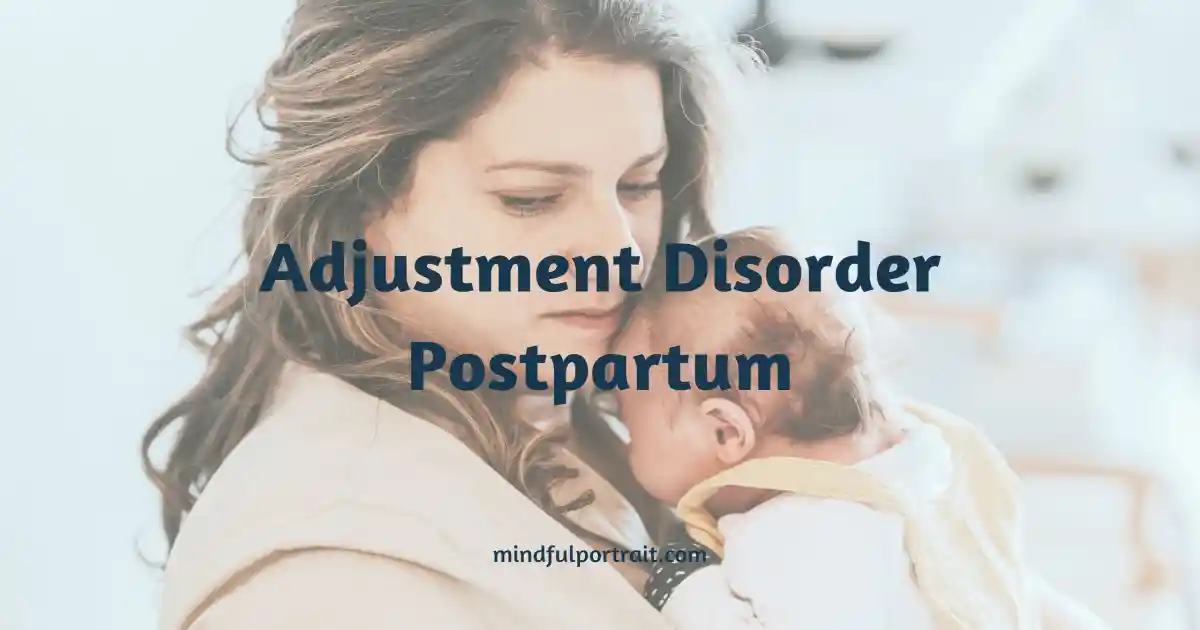Adjustment disorder is one of the most common mental health challenges women face during the postpartum phase. As postpartum depression is a widely recognized term, and the symptoms of adjustment disorder often overlap with those of postpartum depression or anxiety, it is frequently misdiagnosed. Many people tend to group all postpartum mental health struggles under the label of postpartum depression.
Under these circumstances, there is a need to distinguish between normal postpartum mood changes, adjustment disorder, baby blues, and more serious conditions like postpartum depression and anxiety. Recognizing and addressing adjustment disorder early can help manage it effectively, thereby reducing the risk of it progressing into postpartum depression.
Disclaimer: This article is for informational purposes only and is not a substitute for medical advice. If you or someone you know is experiencing postpartum mental health challenges, consult a healthcare provider or mental health professional for proper diagnosis and treatment.
What is Adjustment disorder after pregnancy?
Adjustment disorder refers to unpleasant, unexpected, strong, or disproportionate emotional or behavioral reactions to external stress, major life changes, or challenges. In the postpartum period, significant lifestyle changes and challenges, such as hormonal shifts, sleep deprivation, new responsibilities, and role adjustments, can lead to unintended or maladaptive reactions.
What is normal postpartum adjustment?
Not all reactions are mental health disorders—some are perfectly normal. In the past, the stigma surrounding mental health disorders and women’s postpartum health was a major challenge. Today, in addition to these, another significant challenge is the overwhelming amount of information about mental health and unsolicited advice. Some reactions that are commonly misinterpreted as postpartum depression, adjustment disorder, or postpartum anxiety can actually be part of normal postpartum adjustment. The postpartum phase is never easy, especially in times when there is no ‘village’ to support women, and many are more career-focused.
Normal postpartum adjustment may include:
- Anxiety about the baby’s health or well-being, especially for first-time moms.
- Emotional ups and downs, such as sadness, frustration, and joy, due to hormonal shifts, sleep deprivation, and adjusting to a new life.
- Exhaustion and fatigue from physical recovery after childbirth, coupled with the increased demands of caring for a newborn.
- Lack of focus, concentration, and irritability due to sleep deprivation and fatigue.
- Breastfeeding challenges that may cause emotional struggles and guilt.
- Feelings of isolation, particularly if support systems are limited.
- Self-doubt and mom guilt, affecting self-confidence and self-esteem as a mother.
- Relationship issues due to time management challenges, a tight schedule, and new responsibilities.
Causes or triggers of adjustment disorder postpartum
- Unplanned pregnancy: Lack of proper physical, mental, emotional, and financial preparation can increase stress and make it more challenging to adjust to life changes.
- Hormonal shifts (especially in women with PCOS or thyroid issues): Each woman’s body adjusts uniquely to hormonal changes, and sometimes, this traumatic shift can make her vulnerable, leading to confusion in emotional regulation and making it easier to be triggered by the challenges she faces during this stage.
- Sleep deprivation: The quality and quantity of sleep directly affect a person’s mental health. When this disruption happens suddenly after childbirth, especially if the baby is a poor sleeper and the woman is solely responsible for night feedings and breastfeeding, it can significantly impact her well-being.
- Physical recovery from birth: Unplanned C-section, complications like wound infection, perineal tears, and gestational diabetes can be additional triggers.
- Unrealistic expectations regarding motherhood: Societal norms that glorify motherhood, especially when breastfeeding and bonding are idolized as a divine connection, along with a lack of awareness about the challenges of motherhood, can make a woman susceptible to losing control over her emotional regulation.
- Social isolation: Sudden isolation, particularly for women used to a wide social circle or working , can be a significant challenge.
- Financial stress: New expenses and the decision to become a stay-at-home parent can create a tough phase to overcome.
- Career goals: The uncertainty regarding career and achieving a work-life balance is another contributor.
- Breastfeeding challenges (including breastfeeding failures): Unexpected breastfeeding challenges, such as poor milk supply, difficulty establishing and maintaining it, confusion about quantity, and physical discomfort during breastfeeding, are among the most common reasons behind Adjustment disorder postpartum.
- Previous mental health history: Prior mental health conditions such as depression, anxiety, OCD, bipolar disorder, etc., can be trigger factors for adjustment disorder.
- Trauma or birth complications: Trauma or birth complications, such as a difficult delivery, NICU stay, or issues like meconium aspiration, can lead to anxiety or depression, potentially having a lasting impact on mental health.
- Lack of support: When a woman faces a lack of support in physical recovery, emotional support during challenging phases, and shared responsibilities, it can deeply affect her well-being.
- Relationship issues: Women facing relationship issues during the postpartum phase may struggle more than others.
- Unexpected circumstances: This includes factors like the child’s gender, mode of delivery, baby health issues (e.g., preterm or low birth weight), betrayal by partners, friends, or family, and career challenges.
Adjustment Disorder, Normal Postpartum Adjustment, and Other Mental Health Disorders
Adjustment disorder typically begins within three months after childbirth and, if well-managed, usually resolves within six months. It is less severe than postpartum depression, PTSD, or other similar mental health disorders but more severe than the baby blues, which typically last for only two weeks.
Symptoms of adjustment disorder can overlap with those of postpartum depression, anxiety, or even normal postpartum emotional adjustments. However, the key difference is that, in adjustment disorder, these symptoms significantly affect daily life, are more persistent and noticeable than those of the baby blues, but they tend to resolve as the individual adapts to the new phase, unlike postpartum depression or postpartum anxiety, which often require longer-term treatment.
Symptoms of adjustment disorder postpartum
Symptoms of Adjustment Disorder can vary from person to person, influenced by factors such as temperament, lifestyle, personality, and the unique stresses they are facing. These symptoms can range from mild to severe emotional distress, with common symptoms including:
1. Emotional outbursts – The expression of emotions in an intense manner, often more severe than what would be expected as a normal reaction to a particular situation.
2. Difficulty sleeping – Despite sleep deprivation, physical exhaustion, and mental fatigue, the person struggles to fall asleep or stay asleep.
3. Feeling of worthlessness – Struggling with mom guilt, feeling like a failure or “bad” mom, having self-doubts about parenting choices, and feeling hopeless about the future, especially due to the identity crisis that often accompanies motherhood.
4. Frequent crying – Episodes of crying that occur frequently, often without a clear cause or triggered by very minor issues, and difficulty controlling or stopping the tears.
5. Inability to handle daily activities – Feeling demotivated and finding it impossible to manage tasks or responsibilities. This can also include the inability to enjoy activities that were once pleasurable, a symptom often seen in postpartum anhedonia.
6. Difficulty bonding with the baby – Challenges in forming an emotional connection with the baby and enjoying time together.
7.Social withdrawal – Avoiding interaction with family, friends, or others, and even withdrawing from time with the partner.
8. Increased irritability – Feeling easily frustrated or agitated, even over small issues.
9.Reckless or risk-taking behavior – Engaging in impulsive behaviors as a way to cope with emotional distress.
10. Physical symptoms – Body aches, headaches, stomachaches, or other physical ailments in response to stress.
11. Mental exhaustion – Feeling completely drained mentally or emotionally , with no room for anything anymore, not even smallest challenges.
Management
- Seek Professional Help: A mental health professional, after thoroughly assessing the symptoms, may recommend psychotherapy, talk therapy, or even medication depending on the situation. If the condition is clearly affecting the person’s life, do not delay seeking professional consultation.
- Establish a Support Network:The postpartum phase is not easy for anyone, so there is no reason to feel hesitant about seeking help. Parental responsibilities should be shared and addressed, and support should be found after assessing the areas that need it.
- Communicate Openly: Speak up for yourself, communicate your needs and feelings, and learn to say no when necessary. Build genuine friendships. Even with a tight schedule, try to engage in deep conversations with your partner.
- Find a Stress Management Technique: With more stressors on the way, finding a stress management technique can be helpful. This can be anything, such as a mindfulness activity, a mindful walk, or taking a deep breath. Focusing on your breathing pattern when stressed, taking a bath, having a coffee, moving around, singing a song, or listening to music—whatever helps you manage and overcome a stressful situation in a healthy way. Explore 30 mindful hobby ideas for your mental health.
- Explore an Emotional Outlet: Even with a busy schedule, make it a habit to reflect on your emotions, process them, and find an emotional outlet. It can be anything, such as journaling, painting, or blogging. Include self-care rituals or me-time activities in your daily life. This set of 10 mindful “When Did I Last” questions can help you stay on track and monitor your self-care as a new mother.
- Engage in Physical Activity: Even with a busy schedule and physical exhaustion, engaging in any physical activity like mild walking can still be important for recovery, both for the body and mental health.
- Preserve Identity outside motherhood: As losing identity is an important factor in triggering postpartum adjustment disorder, make sure to do something to preserve your identity outside of motherhood. This can be anything from engaging in your own hobbies, setting career goals, or staying in touch with your personal friends, not just mommy friends.
- Set realistic Goals: Setting realistic goals and expectations is an important factor in healthy motherhood. Be open only to positive people and positive advice. Stay updated on parenting information, but avoid overwhelming yourself with excessive details.
Reflections from Mindful portrait
Adjustment disorder postpartum is a condition that requires care, support, and guidance. A woman experiencing this disorder should be treated with empathy rather than having her feelings dismissed. It is commonly seen that those around her make her feel inadequate as she struggles to adjust to new life changes. It is equally important not to invalidate her feelings by labeling them as exaggerations of a normal experience, nor should her symptoms be generalized as postpartum depression or anxiety. Always note that if adjustment disorder is not handled properly, it can impact her mental health and potentially lead to more serious mental health conditions.

